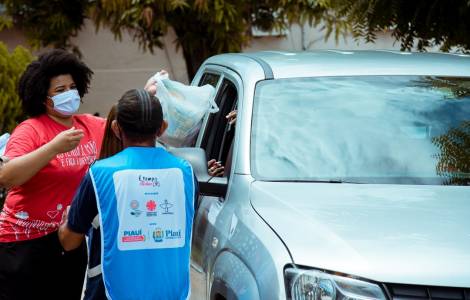
Celam
Teresina (Agenzia Fides) - 80% of the inhabitants of Piauí, a Brazilian state located in the northeast of the country, in the arid region of Sertão, suffer from hunger. According to the report of the "Rede Brasileira de Pesquisa em Soberania e Segurança Alimentar e Nutricional", RBPSSAN, 33 million Brazilians survive in a situation of food insecurity.
According to information published by the Episcopal Conference, statistics reveal that approximately one million people in Piauí do not have regular access to food and do not even know if they are going to eat. The national survey on food insecurity in Brazil revealed that only 20% of the inhabitants of Piauí are guaranteed to have at least three meals a day and are therefore immune to this sad reality. 34.3% face "severe" food insecurity, 20% "moderate" food insecurity and 25.8% "mild" food insecurity.
The "É Tempo de Cuidar" campaign has contributed significantly to the fight against hunger in Piauí by providing assistance to families, without forgetting that the distribution of food certainly does not solve the root of the problem, but requires the implementation of more effective and coherent public policies by the government, central and local.
The situation is even more critical among the children of the state. Hunger and malnutrition affect their development in various ways. In addition to being the main causes of infant mortality, they have cognitive, social and emotional effects, affecting abilities such as memory and attention.
The local Church, through the Children's Ministry, tries to follow the families by offering them a point of reference and help. "Those in charge of the pastoral care of children, when they make home visits, encounter this sad reality in most homes. We try, as a Church in the region, to join efforts with other social pastoral care to support those who need it the most" said the regional coordinator of pastoral care, Viviane Medeiro.
Piauí is the poorest state in Brazil, with just over 3 million inhabitants. Without an industrial sector, it bases its economy on agriculture and, above all, on cattle breeding. Most of the state has a semi-arid climate, the coastal strip is only 66 km long, and on its territory there are important archaeological sites with the remains of prehistoric Amerindian civilizations. The capital city, Teresina, was designed in 1852 according to a checkerboard plan. Located where the Parnaíba and Poti rivers meet, Teresina is known as the "green city" due to the many mango trees that line its streets. (SL) (Agenzia Fides, 24/3/2023)